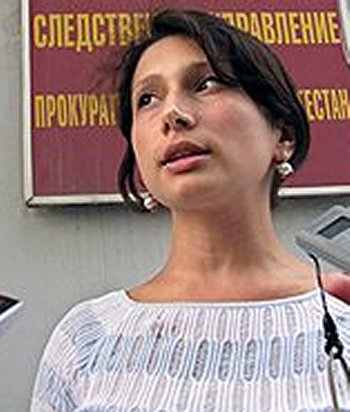
Dagestan’s Most Significant Opposition Newspaper Accused of Extremism
Publication: Eurasia Daily Monitor Volume: 6 Issue: 125
By:

On June 15, the Dagestani branch of Rossvyazkomnadzor, the Russian state agency that oversees the media, filed a lawsuit to shut down the Makhachkala-based independent weekly Chernovik because of its alleged support for extremist views, and on June 18 the paper had its first court hearing. At the same time, the newspaper’s outspoken editor-in-chief Nadira Isaeva and several of the paper’s reporters are involved in a separate criminal court case, accused of inciting interethnic strife (www.kavkaz-uzel.ru, June 18).
Chernovik has regularly had court battles with the authorities, but this is the first time the paper is in such a difficult position. The international press freedom watchdog organization Reporters Without Borders claimed in a grim report on the media situation in Dagestan that Chernovik is unlikely to survive this attack (www.rsf.org, June 25).
The founder of the paper, the well-known Dagestani publisher and media expert Khadzhimurad Kamalov, stated that the paper is a defender of the country’s constitution and federalist principles. According to Biyakai Magomedov, Chernovik’s legal expert and a writer for the paper, if the court shuts down Chernovik, it will be the end of democracy in the republic and the triumph of brute force in dealing with problems (www.kavkaz-uzel.ru, June 18).
The authorities’ attack on Chernovik started soon after it published an article about a highly controversial counter-insurgency operation in Makhachkala during which, according to the paper and other reports, innocent people were killed – including a professor of a local university, his wife and their friend (www.chernovik.net, July 4, 2008).
Dagestan has been the arena of a fierce battle between the law enforcement authorities and Islamic militants for the past four years. Earlier this month, the republic’s Islamist insurgent group, the Sharia Jamaat, even claimed responsibility for the assassination of the republic’s Interior Minister, Adilgerei Magomedtagirov, on June 5 (www.jamaatshariat.com, June 11; EDM, June 12). Magomedtagirov was the highest-ranking official to be killed in Dagestan during the entire post-Soviet period.
However, according to numerous human rights and media reports, in the process of combating the insurgents though, law-enforcement has habitually crossed the legal red line. Chernovik became one of the frontline media outlets in detailing the role of the police in the continuing violence in the republic. Nadira Isaeva put it this way: "It should be admitted that, in reality, there is a war going on in the North Caucasus. Law enforcement agencies have become … the catalyst of this war. They are the direct factor [contributing to] the aggravation of this situation" (Radio Free Europe/Radio Liberty, February 25).
On August 26, 2008, the homes of Chernovik’s editor-in-chief, several of the paper’s reporters and its founder were searched by police. According to the founder of Chernovik, Khadzhimurad Kamalov, the search was initiated by Dagestan’s Interior Minister Adilgerei Magomedtagirov. Kamalov stated that he had accused Magomedtagirov of corruption at a meeting with Dagestani president Mukhu Aliev and other top officials prior to the searches (www.kavkaz-uzel.ru, August 27, 2008). Meanwhile, the fact that Kamalov was received by Dagestan’s president may signify that he enjoys certain support from republican officials.
Articles published by the paper show why the police may have been annoyed. On July 4, 2008, Chernovik published a list of police jobs and the matching bribes in U.S. dollars that people pay in order to obtain those jobs. The bribes ranged from $500 for the position of lowest ranking patrol policeman to $25,000 for the position of an internal security operative working for the police. In the same issue, the paper published the Top Ten list of rights abusers among law enforcement structures. The ORB-2 police detachment, based in Grozny and notorious for human rights abuses, was put in first place while the units of the GRU (Russian military intelligence) came in last, at number ten.
Dagestan has enjoyed the most vibrant media in the North Caucasus. The republic is so diverse – it is home to over thirty ethnicities – that no ruler has been able to bring the whole republic under tight control, as has happened too often elsewhere in the region. Almost nowhere else in the North Caucasus could a newspaper have allowed itself to criticize a republican president without suffering swift and grave consequences.
Indeed, the Dagestani press has not spared the republic’s president, Mukhu Aliev. Chernovik wrote last year: "When the president of the republic allows himself, addressing the Elders Council, to threaten ‘You are still criticizing the police. Dare not. You will end up badly’ they will make mincemeat of this village [Gimry]!’ – that is reminiscent of 1937 [the Stalin-era mass repressions]. The absurdity of the situation is in the fact that the president, the servant of the people, threatens the people with reprisals that another servant – the police – will make happen. Imagine: you pay taxes for your [public] servants, so that they [can] ‘make mincemeat’ of you" (Chernovik, January 25, 2008).
If Chernovik is shut down, it could have a negative impact on other media outlets as well, even though there will still be several influential papers left. On June 17, the New York-based Committee to Protect Journalists called on the authorities in Dagestan to drop extremism charges against the editor Nadira Isaeva and four reporters.
It is highly characteristic of the authorities in the Northern Caucasus, as elsewhere in Russia, to regard the media as the cause of the problems that it covers. Under conditions like those that exist in the North Caucasus, the denial of press freedom exacerbates the fight between the law enforcement structures and the insurgency, given that the media in places like Dagestan is the only real means of control over police actions. If this instrument of public oversight, however weak it may be, is removed, there will be nothing left for the abused people, other than to acquiesce or revolt.




